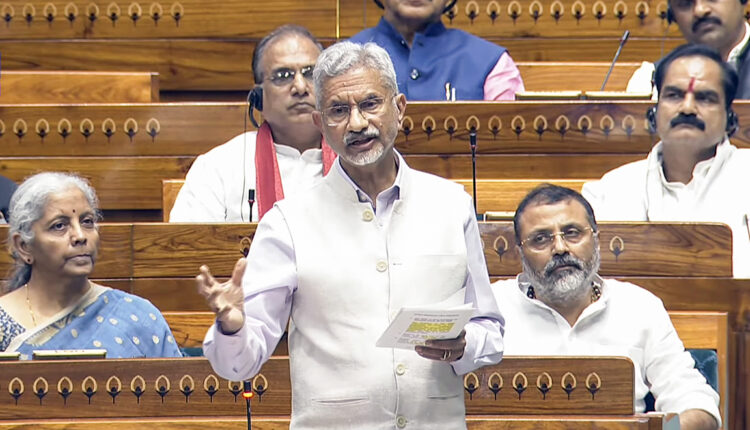External Affairs Minister S. Jaishankar on Wednesday asserted in the Rajya Sabha that the Modi government has corrected the “historical mistakes” made by former Prime Minister Jawaharlal Nehru on the Indus Water Treaty (IWT), stating that the agreement has now been put in abeyance until Pakistan ends its support for cross-border terrorism.
Participating in a debate on Operation Sindoor, Jaishankar began by expressing gratitude to the armed forces for their swift and effective response to the Pahalgam terror attack on April 22.
“The manner in which people were killed in front of their families, the fact that their religion was asked before killing them, and the intent to derail the peace and prosperity of Jammu and Kashmir – all of this shocked the nation,” he said. “There had to be severe consequences.”
He said the Cabinet Committee on Security (CCS) met the very next day and took a series of strong decisions, including cancellation of Pakistani visas under SAARC, reduction in diplomatic strength, expulsion of military advisers, and most notably, placing the Indus Water Treaty in abeyance.
Calling the treaty “extraordinary”, Jaishankar said: “I cannot think of any other agreement in the world where a country has allowed its major rivers to flow into another country without retaining rights over them.” He said the treaty, signed in 1960, was made with the intent of goodwill and friendship, but India has only received “terrorism, attacks, and wars” from Pakistan since.
Referring to parliamentary proceedings from the time, Jaishankar quoted Nehru’s remarks that the Indian government was mindful of the interests of West Punjab (in Pakistan) while finalising the treaty. “Not a word about the interests of our own people – our farmers in Kashmir, Punjab, Rajasthan, and Himachal Pradesh,” he said.
“He [Nehru] said we purchased peace, but within a year, he himself admitted there was no peace. What we purchased was not peace, but appeasement,” the Minister said. “This government has corrected those mistakes.”
‘Blood and water cannot flow together’
“The Modi government has suspended the Indus Water Treaty with Pakistan until it irrevocably gives up its support for terrorism. Blood and water will not flow together,” Jaishankar said.
Referring to major terror incidents under the UPA government, the EAM recalled, “In the decade before the Modi government came to power — in 2006, the Mumbai train bombings killed 186 people; in 2007, 44 died in Hyderabad; in 2008, 26/11 happened in Mumbai; 64 were killed in Jaipur; 57 in Ahmedabad; and Delhi was also bombed in 2008. I am reminding the House how the world watched India’s response at that time.”
He criticised the then government’s response to the 2006 Mumbai attacks, saying that India limited itself to dialogue and condemnation instead of holding Pakistan accountable.
“Even after 26/11, India said that terrorism is a threat to both India and Pakistan. That was the approach then,” he said.
‘New global narrative on terrorism’
Highlighting what he described as a “decisive shift” in India’s response to terrorism in the past decade, Jaishankar cited the Uri surgical strikes, Balakot airstrikes, and Operation Sindoor as examples of a more assertive posture.
He also outlined India’s diplomatic successes in getting global recognition for its counter-terror efforts. “In the last decade, we have placed terrorism firmly on the global agenda – be it BRICS, SCO, QUAD or bilateral forums,” he said.
He highlighted diplomatic victories under Modi’s leadership, including getting notorious terrorists like Masood Azhar and Abdul Rehman Makki designated under UN sanctions.
“When we were on the UN Security Council, we held a counter-terrorism meeting at the site of the 26/11 attacks – the Taj Hotel in Mumbai. That event sent a powerful global message about India’s resolve,” he said.
The EAM further noted India’s success in bringing back key terror accused, including Tahawwur Hussain Rana, wanted for his role in the 26/11 attacks.
“He has finally been brought back to India by the Modi government,” Jaishankar said.
He also pointed to India’s role in securing the UN designation for The Resistance Front (TRF) as a terrorist organisation.
“The UN’s monitoring team submitted its report, which, for the first time, mentions TRF and acknowledges its ties with Lashkar-e-Taiba. We secured a UN recognition of TRF as a proxy for LeT and responsible for the Pahalgam attack,” he said.
The Minister also pointed to growing international support, citing the recent BRICS statement condemning the Pahalgam attack and cross-border terrorism. “This is the first time we were able to get an explicit reference to a specific terrorist incident,” he said.



